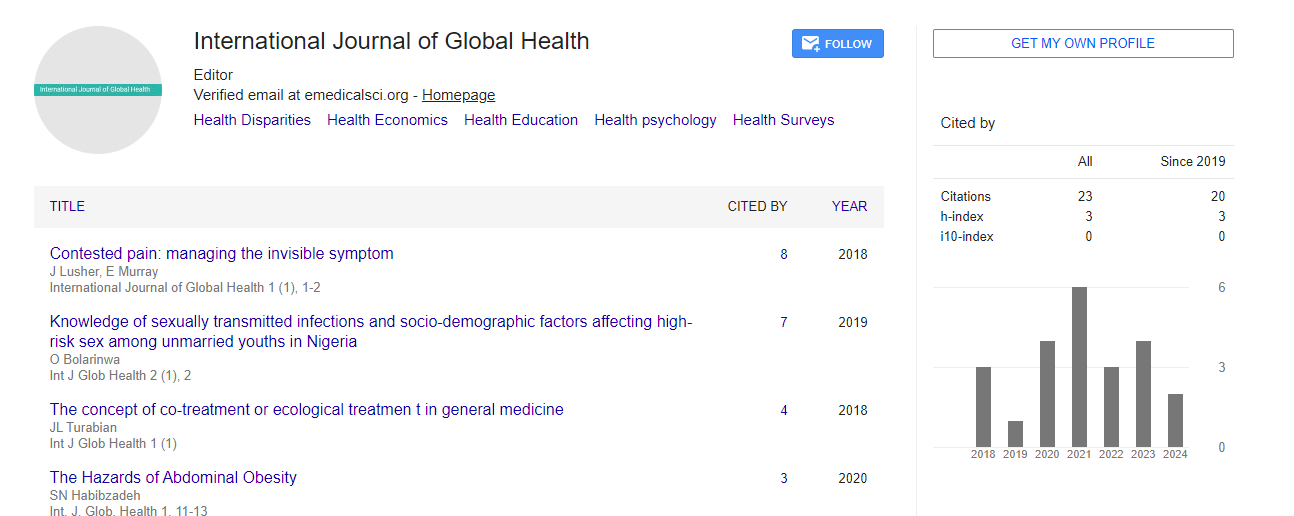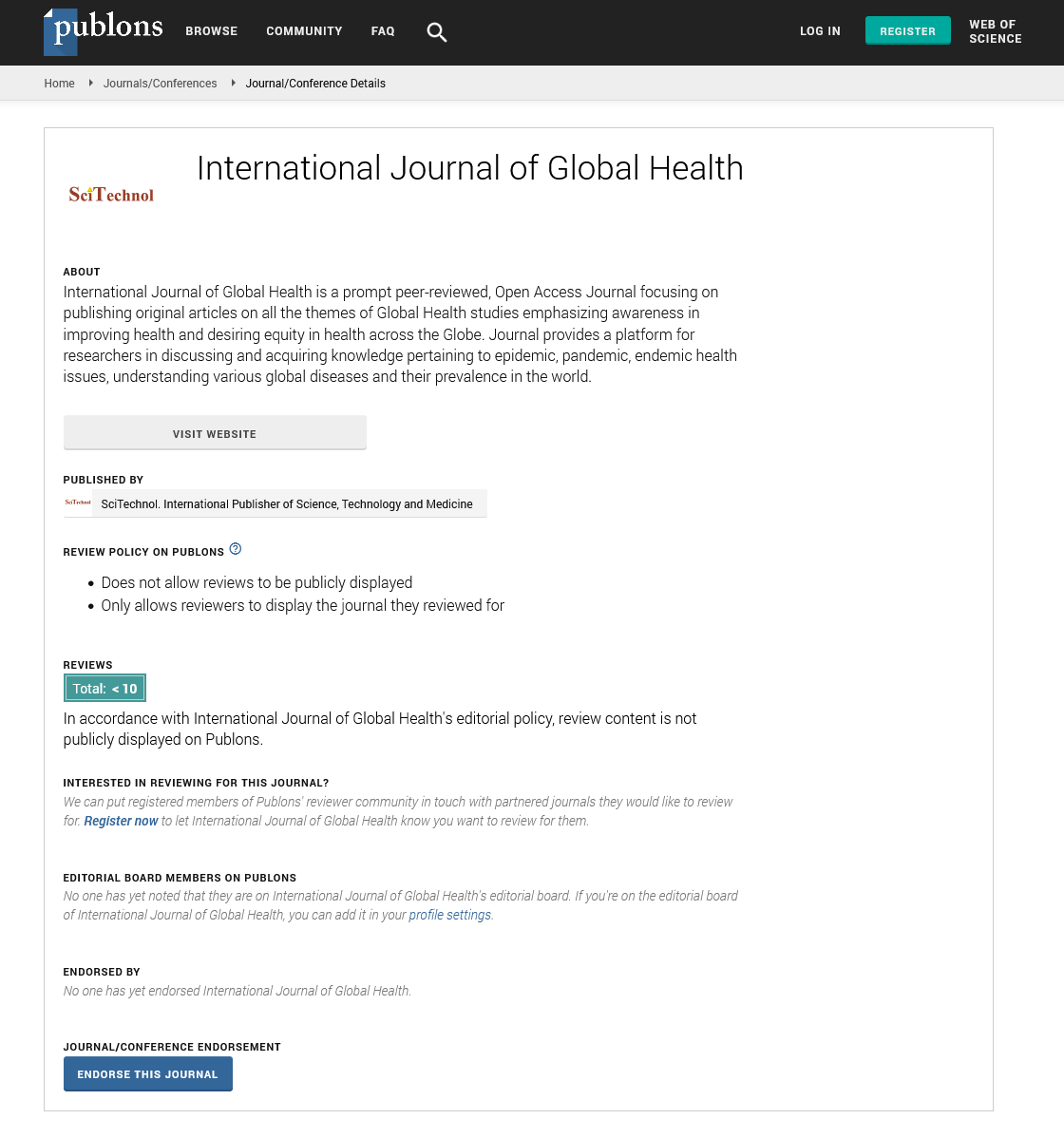Opinion Article, Int J Glob Health Vol: 6 Issue: 1
The Role of Health Economics in Shaping Healthcare Policies and Systems
Mieke Gatzweiler*
Department of Public Health, Maastricht University, Maastricht, The Netherlands
*Corresponding Author: Mieke Gatzweiler
Department of Public Health, Maastricht
University, Maastricht, The Netherlands
E-mail: gatzweilermieke@gmail.com
Received date: 21 February, 2023, Manuscript No. IJGH-23-96060;
Editor assigned date: 23 February, 2023, PreQC No. IJGH-23-96060 (PQ);
Reviewed date: 09 March, 2023, QC No. IJGH-23-96060;
Revised date: 16 March, 2023, Manuscript No. IJGH-23-96060 (R);
Published date: 23 March, 2023, DOI: 10.4172/Ijgh.1000175
Citation: Gatzweiler M (2023) The Role of Health Economics in Shaping Healthcare Policies and Systems. Int J Glob Health 6:1.
Description
Health economics is a multidisciplinary field that combines economics and health sciences to study how resources are allocated, utilized, and distributed in the healthcare sector. It plays an important role in informing healthcare policies and systems, as it provides valuable insights into the economic aspects of healthcare decision-making. In this article, we will delve into the importance of health economics in shaping healthcare policies and systems, discussing key concepts and applications in the field.
Understanding the basics of health
Economics Health economics is concerned with examining the production, consumption, and distribution of health and healthcare services. It involves the application of economic principles and methods to analyze issues such as resource allocation, healthcare financing, healthcare delivery, and health outcomes. Key concepts in health economics include cost-effectiveness analysis, cost-benefit analysis, economic evaluation, demand and supply of healthcare, and healthcare markets.
Resource Allocation in Healthcare One of the central areas of study in health economics is resource allocation, which involves determining how limited resources, such as healthcare budgets, healthcare facilities, and healthcare workforce, are allocated to achieve the best possible health outcomes for a given population. Health economists use various techniques, such as cost-effectiveness analysis and cost-benefit analysis, to evaluate different healthcare interventions and determine which ones provide the best value for money.
Healthcare financing
Healthcare financing is an essential aspect of health economics, as it involves the mechanisms by which healthcare services are paid for and funded. Health economists analyze different healthcare financing systems, such as single-payer systems, social health insurance, and private health insurance, to understand their impacts on healthcare access, utilization, and outcomes. They also examine issues related to healthcare reimbursement, pricing, and affordability to ensure that healthcare services are accessible and affordable to those who need them.
Healthcare delivery and organization
The organization and delivery of healthcare services are important determinants of healthcare outcomes and costs. Health economists study different models of healthcare delivery, such as fee-for-service, capitation, and bundled payments, to evaluate their impacts on efficiency, quality, and equity in healthcare. They also analyze the organization and management of healthcare systems, such as hospitals, primary care settings, and long-term care facilities, to identify ways to optimize resource utilization and improve patient outcomes.
Health outcomes and patient preferences
Health economists also examine health outcomes and patient preferences to inform healthcare decision-making. They use healthrelated quality of life measures, patient-reported outcomes, and preference-based valuation methods to assess the effectiveness and value of healthcare interventions. By understanding patient preferences, health economists can help policymakers and healthcare providers make decisions that align with patients' values and priorities, and ultimately improve patient satisfaction and healthcare outcomes.
Policy evaluation and health system reform
Health economics plays an important role in evaluating healthcare policies and informing health system reforms. Health economists conduct rigorous evaluations of healthcare interventions and policies, using econometric methods and statistical analysis to assess their impacts on health outcomes, costs, and equity. They also provide evidence-based recommendations to policymakers on how to improve the efficiency, effectiveness, and equity of healthcare systems, and support the design and implementation of health system reforms.
Health economics is a vital field that contributes to shaping healthcare policies and systems by providing insights into the economic aspects of healthcare decision-making. Through the analysis of resource allocation, healthcare financing, healthcare delivery, health outcomes, and patient preferences, health economists provide evidence-based recommendations to policymakers and healthcare providers to improve the efficiency, effectiveness, and equity of healthcare systems. Health economics plays an importnat role in informing health policy decisions, driving healthcare reforms, and ultimately improving the health and well-being of populations.
 Spanish
Spanish  Chinese
Chinese  Russian
Russian  German
German  French
French  Japanese
Japanese  Portuguese
Portuguese  Hindi
Hindi 
